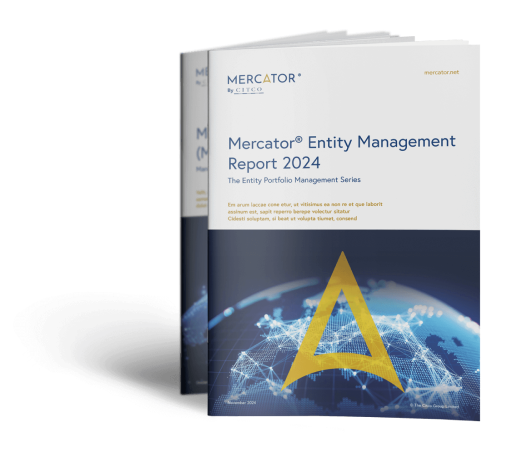The information contained in this document is marketing material and for informational purposes only. The information contained in this document is presented without any warranty or representation as to its accuracy or completeness and all implied representations or warranties of any kind are hereby disclaimed. Recipients of this document, whether clients or otherwise, should not act or refrain from acting on the basis of any information included in this document without seeking appropriate professional advice. The provision of the information contained in this document does not establish any express or implied duty or obligation between Citco and any recipient and neither Citco nor any of its shareholders, members, directors, principals or personnel shall be responsible or liable for results arising from the use or reliance of the information contained in this document including, without limitation, any loss (whether direct, indirect, in contract, tort or otherwise) arising from any decision made or action taken by any party in reliance upon the information contained in this document. © The Citco Group Limited, December 2024.
A Truly Data-Driven Entity Management Portfolio Industry Beckons
In our past newsletters, we addressed the growing challenges facing governance professionals, both in light of the pandemic but also the increasing complexity of the regulatory environment.
As the former begins to subside and countries across the globe continue opening cautiously, workers begin to return to the office and relative normality starts to look like a genuine prospect. Yet the issue of rising complexity persists, putting greater and greater pressure on business leaders and General Counsels of multinationals to continue to innovate with regards to their governance processes.
For General Counsels in particular, there remains the challenge of demonstrating to internal stakeholders that they are performing to the best level possible, in comparison to their peers and the industry as a whole. They must be able to measure performance (e.g. in terms of total tasks, duration, and relative cost) across individual businesses, industries, jurisdictions and regions. To do this, multinationals require quantitative data that has until now, been lacking in the Global Entity Portfolio Management (GEPM) industry, partly because this industry is only now starting to be considered as such. Data that existed on a company level has tended to be available only from a patchwork of internal and external sources in a non-standardized and non-centralised fashion. Industry wide data points have tended to be survey-driven and thus rarely provide a fully accurate and objective picture of the landscape.
“As the pioneer of this emerging industry, we feel it is our responsibility to provide these insights.” Over the last few years, we have collected real-life data across all major industries and 160 jurisdictions using our proprietary system to provide a definitive resource for business leaders and General Counsels on, among other things, the cost and time required to manage an extensive portfolio of entities.
Introducing the Mercator Entity Management (MEM) Report
Our inaugural guide for global businesses provides an invaluable insight into the dynamics of creating and maintaining entities or subsidiaries globally, overall governance and regulatory costs per centre, and average duration taken to complete vital activities.
Taking a holistic overview of the findings we discovered some important observations. For example, we found that there exists a correlation between the duration of activities and pricing thereof per region. This is most clearly demonstrated by the Asia-Pacific region, which, in 2020 and the first half of 2021, had both the shortest average duration and the lowest overall per activity price. However, this obscures the diversity of the Asian jurisdictions, five of which are found in the top 10 most expensive, and in the top 10 least expensive jurisdictions.
Interestingly this correlation between duration and price does not hold as strongly for the Latin American (LATAM) region. The region appears to be more costly than one would expect on the basis of activity duration. As regards speed of business, Argentina took top spot, while Guatemala took bottom position.
When looking at activity pricing, Sri Lanka, Malaysia and Australia all enjoyed a low pricing level, while the People’s Republic of China (PRC), Qatar and Saudi Arabia are among the more costly countries, measured on a per activity basis.
Overall, Singapore emerges as the most favourable location overall in which to base entities when the cost and time taken to complete activities are taken into consideration. Singapore is followed by Australia and then the UK. All three jurisdictions have the ideal combination of cost levels and competitive duration, in descending order. All three are global financial centres with a long-established history of managing international trade, and this translates into the ease with which multinationals can manage entities in these locations. Furthermore, Singapore is oftentimes cited for its government’s efforts in working with businesses and industry partners to step up their resilience during the COVID-19 pandemic.
Kazakhstan had the lowest ranking on a combination of cost and duration, with South Korea and Indonesia the next lowest; all have a combination of relatively higher cost levels, and less competitive duration.
I must note that the purpose of this report is not to advise multinationals on where to base entities or subsidiaries – this is obviously dictated by necessity – but to help set expectations and provide foresight on the relative cost and time it will take to manage entities in each jurisdiction. Clearly, working with a Global Entity Portfolio Management partner that has granular experience and insight into this practice, and moreover is able, in real-time to identify changes to the established patterns, is an important factor in the overall seamless management of your portfolio. I encourage you to read the full report here, and to reach out to your representative at Mercator to arrange a demonstration of our proprietary software in action, as we look toward helping pioneer a truly data-driven entity portfolio management industry.
Kariem Abdellatif
Director of Citco Mercator, UAB, Head of Mercator by Citco

